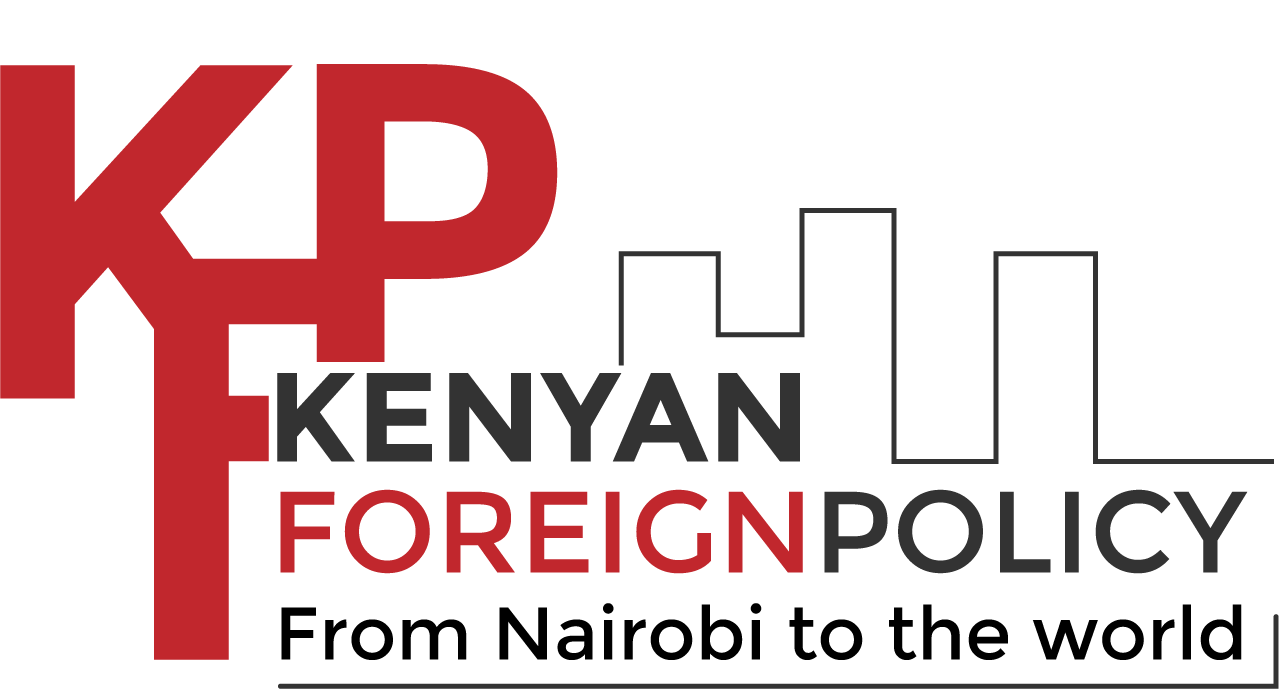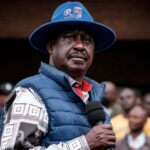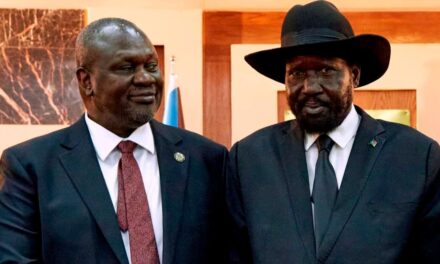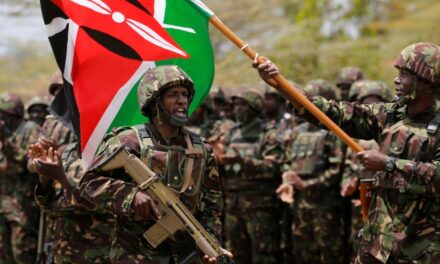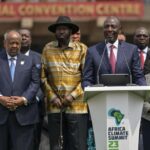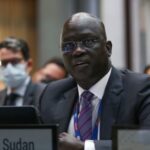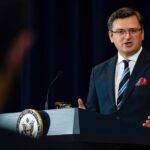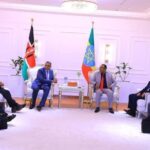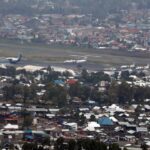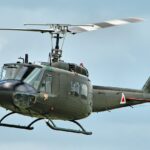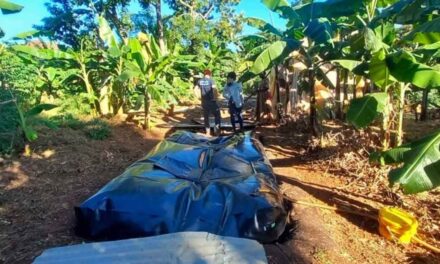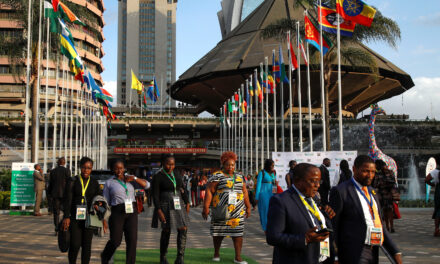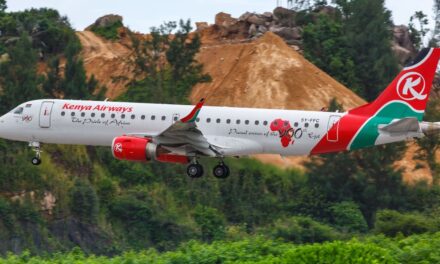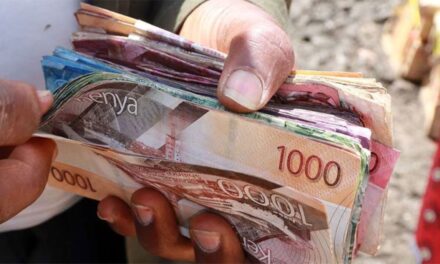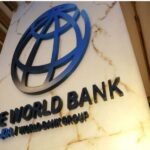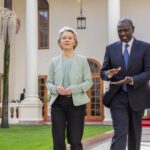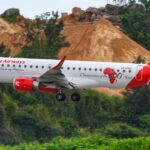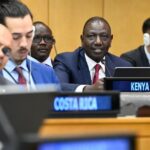

Ruto Repairs Friendship with ‘Old Friend’ Museveni in Nairobi
By Mwangi Maina
| May 16, 2024

Kenya has initiated a new effort to mend relations with Uganda. On Thursday, President Ruto welcomed Ugandan President Yoweri Museveni to Nairobi State House at the start of Museveni’s three-day state visit.
The two leaders aim to renew their countries’ relationship, which has deteriorated since Ruto took office in September 2022.
With his signature look and hat, President Museveni, whom Ruto refers to as the “father of the region,” received a 21-gun salute as a sign of respect. This gesture signals Nairobi’s commitment to renewing and strengthening ties with Uganda.
The visit comes shortly after Kenya Pipeline signed an agreement with the Uganda National Oil Company regarding the importation of petroleum products to Uganda.
In Nairobi, with both presidents in attendance, a tripartite agreement was signed between the Kenyan Ministry of Energy and Petroleum, its Ugandan counterpart, and the Uganda National Oil Company Limited.
This deal aims to streamline trade between Nairobi and Kampala by removing existing bottlenecks.
Previously, Kampala, which viewed Ruto as a ‘friend’, was irked when the former chicken seller, known for his staunch admiration of Museveni’s NRM establishment, sought to block Uganda’s National Oil Company from importing petroleum products.
This strained the friendship, as Kampala saw Ruto’s love for taxation as a significant impediment to regional integration and trade. Consequently, Uganda filed a case against Kenya at the regional Court of Justice.
In 2022, Uganda imported petroleum products worth KSh 208 billion through Kenya, primarily originating from the Gulf. However, when Nairobi refused to grant the required license, Uganda began looking to Tanzania for its petroleum imports.
Spats between Nairobi and Kampala are nothing new. The neighbors — and close trading partners — have long had a complicated relationship due to ideological differences and territorial disputes.
But Ruto now asserts that all obstacles have been resolved following this meeting.
“The tripartite agreement on the importation and transit of refined petroleum products through Kenya to Uganda whose signing we have just witnessed enables the Uganda National Oil Company limited to import refined petroleum commodities directly from producer jurisdictions thus bringing to an end the challenges faced by the sector in Uganda,” Ruto declared.
He added, “We have agreed that all issues around rice, juice, furniture, eggs, chicken and sugar between Kenya and Uganda are now resolved.”
“Kenya and Uganda are firmly united by relations deeply rooted in shared in history, culture and aspirations for peace and prosperity,” he said.
Uganda is Kenya’s largest trading partner, by value of exports, with earnings crossing sh100 billion mark for the first time.
Traders earned sh127.24 billion from orders they trucked to the land-locked country on increased demand for cement clinkers.
Exports to the country are estimated to have climbed 31.94 percent jump over the previous year’s sh96.43 billion.
But Museveni emphasised that the agreements reached are rooted in historical missions that African nations have now solidified.
He expressed his reluctance to repeat what Ruto had already stated in the joint communique, choosing instead to focus on his hilarious historical and cultural lectures whenever he gets a platform.
“More than 60 years ago when we got independence, we did not integrate properly on the historical mission beyond reparations. There were talks that time about uhuru na umoja, but it was not deeply disassembled,” he said.
He paused, “What did Uhuru na Umoja mean?”, arguing that Africa has lost six decades and that’s why there are more problems.
He vehemently championed for a political federation in East Africa, which is a proposed political union of the eight sovereign states of the East African Community in the African Great Lakes region – Burundi, the Democratic Republic of the Congo, Kenya, Rwanda, South Sudan, Tanzania, Somalia and Uganda – as a single entity or government.
Even though Ruto also says a political federation is the ultimate goal of the EAC Regional integration, some of the bloc’s member states haven’t yet fully implemented the customs union and the common market.
In a customs union, member countries remove trade barriers among themselves and maintain common external tariffs.
“Uganda is part of Kenya, part of Tanzania and part of DRC but there in the bedroom. You fellows here (Kenya) you are in the sitting room. Now to go out, we must knock and ask, can I come in the sitting room?” the Ugandan leader lamented about the East African Community restrictions.
In terms of diplomatic representation, Kampala has not had a High Commissioner in Nairobi for over a year following the passing of their former ambassador in January last year.
Your support empowers us to deliver quality global journalism. Whether big or small, every contribution is valuable to our mission and readers.
